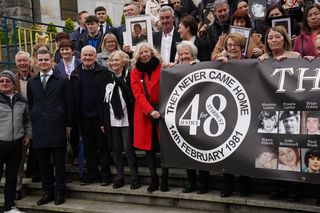High Court Master urges State to 'nationalise' repossessed homes
In a key judgment delivered last Thursday Edmund Honohan said receivers should be regulated, writes Maeve Sheehan
Edmund Honohan
The Master of the High Court has called on the Government to "nationalise" repossessed homes and buy-to-lets that banks have sold to speculators and investment trusts and use them as social housing.
In an interview with the Sunday Independent, Edmund Honohan said the State could address the housing crisis by passing new laws to allow it to compulsorily acquire properties that "the banks dump into the market for speculators".
The outspoken senior official of the High Court and brother of former Central Bank governor Patrick Horohan said "the State simply steps in and takes them [the properties] back. The entities paid a small amount of money for them and they get that amount of money back. They are eliminated from the equation".
Mr Honohan issued a written judgment last week that touched on Danske Bank's bulk sale of more than 400 repossessed homes and properties to a trust fund last year. He likened the transaction to "a Maple 10 golden circle" - a reference to the investors who were offered loans by the former Anglo Irish Bank to buy shares in the bank.
Speaking on foot of his judgement, Mr Honohan said: "You can say, all right, let's go out and build houses. But if you can go out and pick them up for less than the cost of building, then that's what you should do.
"It is open to the legislature in the Oireachtas to pass emergency legislation this side of the new year to incorporate a new body which would compulsorily acquire the property overnight at the stroke of a pen."
Mr Honohan said "there is a well-worn mechanism for compulsory acquisition" and it is a "cut and paste job to produce legislation".
His proposal is that the State would buy the reposs- essed properties from the investment funds that bought them from banks rather than from the banks directly - as it could be difficult to establish their market value.
"The key to it is that the market value for these houses has been struck recently and therefore there can't be any huge profit-taking by the investors," he said.
"My view is that with a general election in the offing, I am entitled to put this out in the suggestion box and invite political parties to look at it."
He said politicians should consult more with lawyers.
"It does seem to me politicians say something must be done. Then they go into power and they go to the civil service and the civil service gives them four options and then they go to the lawyers. It should be the other way around. They should say to the lawyers: 'This is our problem. Can you lawyers come up with a solution?' We actually do have solutions.
"We have the compulsory purchase legislation in place. We know what the Constitution means. We know what can be done with the jot of a pen."
Mr Honohan delivered a written judgment on Thursday in a case taken by Danske Bank against a couple whose investment property had been repossessed. The bank is seeking summary judgment against the couple for outstanding debt following the repossession and sale of their house. The couple later learned their property was one of more than 400 sold as part of a distressed property portfolio to an investment trust, and have raised concerns that theirs was sold for below its market value.
In his written judgment, Mr Honohan said: "Given that we now have a public housing shortage, it is sobering to realise that the State could have - probably should have - bought up this distressed housing stock at the time, at knock-down prices, instead of losing them to the unregulated and sometimes unaccountable private investment funds. Indeed, it may not be too late to do so via compulsory acquisition legislation."
The retired couple, Patrick and Bridget McGeeney, bought an investment property in Ballybofey, Co Donegal, but later fell into arrears. Having refused an offer for €90,000, the bank sold the property last year for €60,800. The couple's mortgage account was credited with €52,575, after receivers' fees of €8,225 were deducted. Danske Bank sued the couple for the remainder of their debt. However, the McGeeneys claim the bank sold the property for less than market value as part of a bulk sale to Finsbury Circle Nominee Ltd, a fund set up by Davy Stockbrokers on behalf of a client.
In his judgement, Mr Honohan found the couple had several lines of defence to advance against the bank. He questioned the role of receivers in the case and, in general, said they should be subject to state regulation.
He raised questions as to how the €60,800 price for the property was arrived at. He said the fundamental issue may be "what is the evidence that such was the price actually paid by the new owners and how was the particular price identified?" and whether the "whole process" of pricing the portfolio was a "sham exercise".
In comparing the transaction with the Maple 10 deal, Mr Honohan said: "Furthermore, when the sale is by a receiver with power of sale and the purchaser has all the appearance of a tenderer pre-selected by the mort- gagee, we have all the hallmarks of a Maple 10 golden circle."
He pointed to a "strong legal case" of liability to be shared by the bank and the receiver "if the sale price knowingly undervalues the security property".
A spokesperson for Danske Bank said it does not comment on individual cases.
As Master of the High Court, Mr Honohan is not a judge but a barrister who presides over the Masters Court and is concerned primarily with procedural issues and case management.
He has been outspoken on the financial affairs that come before his court. In the past, he has accused banks of "hounding borrowers to suicide" and has repeatedly questioned whether the fast-track courts procedure gives bank borrowers a fair chance to mount a defence.
Join the Irish Independent WhatsApp channel
Stay up to date with all the latest news














